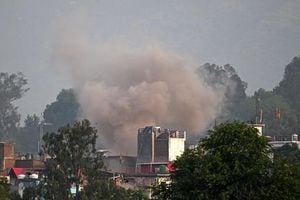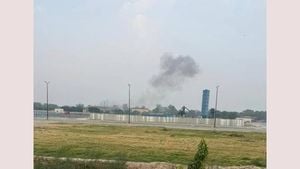In a troubling escalation of tensions between Pakistan and India, General Asim Munir, the chief of the Pakistan Army, and his confidant, Lieutenant General Muhammad Asim Malik, have been implicated in orchestrating a deadly terrorist attack in Pahalgam, Kashmir. Security sources suggest that this attack, which resulted in the deaths of 26 people, primarily tourists, was a calculated move to bolster their legitimacy amid internal strife and criticism.
The Pahalgam incident, which occurred on April 22, 2025, has sparked fierce reactions from both nations. Munir, who has been criticized for his leadership style and controversial rise to power, addressed troops from atop a tank during a military exercise shortly after the attack, warning that any "military misadventure" by India would be met with a "swift and notched-up response." He emphasized the military's "unyielding resolve" to defend Pakistan's sovereignty and territorial integrity "at all costs." This statement underscores the gravity of the current situation and the potential for further conflict.
According to The Federal, a consensus among security officials indicates that both Munir and Malik played significant roles in facilitating the Pahalgam attack. While Malik may not have known the exact timing or location of the assault, sources believe he was aware that an attack on tourists was imminent. This perspective reflects a broader concern that the military leadership is leveraging heightened tensions with India to consolidate power and distract from domestic challenges.
The backdrop of this conflict includes a series of violent protests in Pakistan following the arrest of former Prime Minister Imran Khan on May 9, 2023. In a closed-door meeting, Munir reportedly threatened the families of his critics, revealing the extent of his anxiety over his position and the potential backlash from Khan's supporters. The atmosphere of fear and intimidation within the military ranks has only intensified since Khan's ousting, with Munir seeking to establish control amidst rising dissent.
Munir's rise to the position of army chief was contentious; he was initially slated to retire in late 2022 but received an extension that allowed him to assume command. His earlier tenure as the head of the Inter Services Intelligence Directorate (ISI) was abruptly cut short after Khan raised concerns about his loyalty. This history of conflict with Khan has left Munir vulnerable to criticism, particularly from factions within the military that remain loyal to the former prime minister.
In the wake of the Pahalgam attack, Munir's rhetoric has become increasingly aggressive. He has invoked religious sentiments, claiming that the conflict with India is fundamentally rooted in religious differences. Just days before the attack, he urged Pakistanis to educate their children about the "stark differences between Hindus and Muslims," framing the Kashmir issue as a critical part of Pakistan's identity. His comments have been interpreted as a signal to militant groups operating in the region, raising fears of further violence.
India, for its part, has responded vehemently to Munir's provocations. Prime Minister Narendra Modi has vowed to identify and punish those responsible for the Pahalgam attack, asserting that India will pursue terrorists "to the ends of the Earth." His administration has labeled Pakistan as the "epicenter of global terrorism," further straining diplomatic relations.
In a show of military readiness, Pakistan has conducted missile tests, including a Fatah series surface-to-surface missile and an Abdali ballistic missile, signaling its preparedness for potential conflict. The situation has led to international concern, with Iran's foreign minister visiting Islamabad to mediate between the two nuclear-armed neighbors, while airlines such as Air France and Lufthansa have rerouted flights to avoid Pakistani airspace.
As tensions escalate, analysts have noted that Munir's hardline stance represents a departure from the more tempered approach of his predecessor, General Qamar Javed Bajwa. This shift has raised alarms among observers who fear that the situation could spiral out of control, especially given the historical volatility of India-Pakistan relations.
The Pahalgam attack has not only intensified the military's focus on India but has also exposed internal divisions within Pakistan's leadership. Munir's alliance with Malik, who has been described as uninspiring and lacking vision, raises questions about the effectiveness of their strategies in navigating the complex geopolitical landscape.
Furthermore, Munir's family connections have come under scrutiny. Investigative journalist Ahmad Noorani has reported on the influence of Munir's relatives in key government positions, suggesting that his rise has been facilitated by nepotism rather than merit. This perception of favoritism could undermine his credibility as a leader and exacerbate existing tensions within the military and the civilian government.
As the situation continues to unfold, the international community watches closely. With both nations possessing nuclear capabilities, the stakes are incredibly high. The potential for miscalculation or escalation remains a pressing concern, particularly as both sides prepare for what could become a protracted conflict.
In summary, the Pahalgam terror attack has not only brought Pakistan and India to the brink of war but has also revealed the intricate dynamics of power within Pakistan's military leadership. General Asim Munir's aggressive posturing and the implications of his alliance with Lieutenant General Muhammad Asim Malik could have far-reaching consequences for regional stability.





